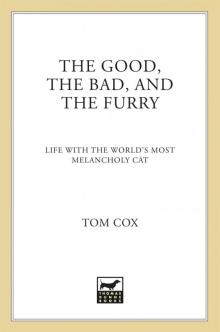Educating Peter Read online
About the Book
A bit like Fear and Loathing in Las Vegas, but with crisps . . .
Peter’s mum and dad are worried. It’s not just the mumbling and the melancholic moods, coupled with Peter’s ever-more-militant mop of curly hair. Forget the oversized trousers complete with dangling metal chains. The problem is that Peter is fourteen and he wants to be a rock star. OK, he wants to be a musician, as long as it involves a guitar, bags of money, free CDs, and unlimited scantily clad groupies (and it’s not classical music).
Peter’s parents convince their music-critic friend Tom Cox to guide Peter to the dark heart of Britain’s musical heritage and expand his horizons. Their journey takes them to Cambridge seeking former Pink Floyd frontman Syd Barrett where they encounter numerous folkies in tights. After exploring the wilder shores of prog rock, they get up close and personal with Brian Wilson – in a lift. Tom imparts second-hand-record-shop etiquette, and discovers Peter is something of a child prodigy. Most importantly, they drive around, they talk about stuff and Peter eats crisps.
Part coming-of-age story and part urban travelogue, this brilliantly funny book is a must for anyone who has ever been, or been baffled by, a teenage boy.
Contents
Cover
About the Book
Title Page
Dedication
Mama Told Me Not to Strum
Cash or Exchange?
Let It Trickle
Really Funny
Tights
Mr Ed
The Jacket
Cheap Trick – in Color (CBS, 1977)
Hero Punishment
Sally
Various Artists – Nuggets: Original Artyfacts From the First Psychedelic Era (Rhino Box Set, 1999)
Homework
Really Funny (Reprise)
Little Green Folking Hood
A Spiritual Beard
Tom’s Story
Big Kylie Minogue Fan
Really Funny (Reprise Again But a Bit Longer)
The Deep
Pentangle – Basket of Light (Transatlantic, 1970)
The Big Sleep
Paper v. Stone: The Showdown
Really Low-Fi
Smashing Pumpkins – Machina/Machines of God (HOT RECORDS, 2000)
Cheating
My Generation
Axe Demons
Acknowledgements
About the Author
Also by Tom Cox
Copyright
Educating Peter
Tom Cox
To Brewer
MAMA TOLD ME NOT TO STRUM
THE WAY I remember it is something like this.
He drags himself into the room, eyes to the floor, hands buried in the arms of his long-sleeve t-shirt. Jenny says, ‘Pete, meet Tom’; he mumbles hello. He roots around in the cupboard for a packet of crisps. I ask him what CDs he’s bought recently; he mumbles something about the second AC/DC album. He shuffles away, back to his bedroom.
I say, ‘So. I’ll pick him up a week on Tuesday, then?’
Jenny says, ‘If you could, that would be wonderful. He’s got fencing class from ten till eleven, then he’s all yours.’
I say, ‘Right, er, cool. I guess I’ll be off.’
Jenny says, ‘Mind out for those roadworks on the North Circular.’
And that’s how it all started.
Did I miss a bit out? Possibly. There’s a chance he picked up one of his bass guitars and plucked disconsolately at it for thirty seconds before he rooted around for the crisps. Perhaps we even shook hands. What’s pretty certain, however, is that our first meeting couldn’t have been described as ‘unforgettable’. Nothing screeched, sparked or went ‘Kapow!’ Nobody called the police or drove a 1969 Aston Martin.
Like many men who’d grown up playing with too many model cars and watching too many films starring Warren Oates, I’d often fantasised about this moment: the beginning of my Great Road Trip. I’d pictured Jeff Bridges haring out of nowhere in a Dodge Charger to save Clint Eastwood from a shower of bullets during the opening scene of Thunderbolt And Lightfoot. I’d pictured a big sky, a fast car, a hopelessly romantic meeting of inseparable outlaws, perhaps with the added bonus of a couple of loose women looking for a ride to nowhere in particular. But now this was it: I was here, finally embarking on my adventure, and all I could see was a North London kitchen, the first flowering of acne, some rather fetching Ikea units and a Slipknot t-shirt.
Outside the window, a wicked wind took a running jump down Alexander Palace hill, whipping along Crouch End Broadway, making a couple of local underfed aesthetes unsteady on their feet. Double-parked, my slightly-lower-than-middle-of-the-range Ford Fiesta waited for some action beyond the hot wax it had been lavished with earlier that day. Upstairs, in his room, the Thunderbolt to my Lightfoot attempted to master the riff to Metallica’s ‘Enter Sandman’. North London slept. Nothing continued to not happen. I decided, on balance, I’d settle for it.
Then again, by this point I would have settled for just about anything.
My whole life, I’d been planning some kind of four-wheeled journey into the unknown, but as the years piled up – that is, the years when it is still dignified to drive around for the hell of it while dressed in a loud shirt, listening to even louder music – my Great Rock And Roll Road Trip had become in danger of turning into My Great Bag Of Hot Air. The original idea had been something fairly vague that I’d dreamt up on receiving my first plastic pedal car as a seven-year-old: I would drive, anywhere, mindlessly, just for the thrill of driving. In my late teens, this was modified to the cliché of all Great Road Trip clichés: I would fly to New York, buy an ineffably cool second-hand car and drive cross-country to San Francisco, picking up hobos, buskers and itinerant jazz musicians on the way. However, in 1997, as I was travelling back from an Italian holiday, the plane had been struck by lightning, plummeting 1,000 terrifying feet before righting itself. As a result, I’d vowed not to take to the air for the foreseeable future, thus making America a less viable option. Additionally, I’d finally got around to reading Jack Kerouac’s On The Road, rather than just talking about it, and discovered it was a vacuous pile of antelope droppings.
More recently, my thoughts had turned towards the winding B-roads and endless Little Chefs of my homeland. Everyone talked about the American Dream, but what about the British equivalent? Did it exist and, if so, what did it look like? How come you never saw rootless outlaw types cruising through the Lake District just for the existential hell of it? Was drifting banned in Britain, and had someone forgotten to tell me?
I wanted to discover the real Britain. Whatever this was, I felt certain it was out there: a rock and roll place every bit as weird as the backwoods America that writers like Hunter S. Thompson and Tom Wolfe had discovered. But more than anything I wanted an excuse to drive around aimlessly, getting lost in places with names like Snafbury and Little Piddling. All I needed was someone willing to ride shotgun: a relentlessly up-for-it soulmate – the kind of partner who’d be willing to help me out of a gambling debt, come to my aid in a tussle with Hell’s Angels, or, more importantly, navigate me out of a council estate on the outskirts of Hull. But circumstances had changed since I’d begun to lay down the plans for my Great Rock And Roll Road Trip. Many of the friends who’d shared with me in the nihilist’s vision of films like Vanishing Point and Two-Lane Blacktop as twenty-year-olds now held down steady jobs in insurance and the civil service. Most of them simply couldn’t afford to up sticks and abandon their jobs and girlfriends for six months. The ones who could, meanwhile, just couldn’t see the same romance in driving up the M4 listening to Fairport Convention as they’d once seen in cruising along Route 66 listening to The Byrds. There were still the isolated loose c
annons I knew I could count on, of course: Colin and Surreal Ed, a couple of relentlessly cheerful womanisers with a penchant for jumping out of cars at red traffic lights and running into nearby woodland for no apparent reason. These, though, were the kind of insatiable single and free party animals for whom ‘a good book and an early night’ meant the latest issue of Mayfair and only two nightclubs instead of the normal four. In other words, great company in moderation but a veritable health hazard if you were talking about six months on the road, and not one I could afford as a married man with a mortgage and five pet cats to support.
In short, I was beginning to lose hope.
The call from Jenny couldn’t have come at a more desperate moment. Jenny, I could be fairly certain, wasn’t the type of woman who would jump out of your car at a red light and hide in adjacent shrubbery. She was fifty-three, for a start – the same age as my parents – and in full-time employment as a college lecturer. I’d known her since my third birthday party, when, seated in her lap, I’d smeared an ice cream sundae in her hair for reasons I can only remember as ‘to see what it felt like’. Since then, I’d enjoyed the kind of respectfully distant relationship with her that one enjoys with surprisingly cool friends of one’s family whom one has disgraced oneself in front of. I tended to see her, when it came right down to it, at fiftieth birthday parties and weddings. Jenny liked a lot of good blues music and, unlike many of my parents’ other friends, still occasionally found time to go out to the cinema, but it had never occurred to me to call her up to arrange a friendly drink. You just didn’t do that kind of thing with your parents’ mates. Besides, she and her ex-husband, Ian, had their hands full with Peter, a teenage son whom I’d never met but who relatives assured me was just making the transition into the ‘melancholy’ stage of adolescence. For a couple of weeks now, my parents had been hinting that she might get in touch with me with a mysterious proposal, but I couldn’t guess what it could possibly be.
‘It’s about that road trip you’ve been planning,’ Jenny explained to me, after we’d caught up on some random family gossip.
‘Oh. You heard about that? Bit of a non-starter, really.’
‘Yes, well, I had a bit of an idea that I’d like to put to you that might make it a starter again.’
Abruptly, my mind filled with incongruous images of me and a flame-haired ex-hippie cruising along a sun-splashed highway, radio on, sunroof open, discussing the meaning of life. Part of me kind of liked the idea. Part of me didn’t. The remainder was alive with questions. What would my wife think? Where could this journey possibly go? How many times would we have to stop at Ikea?
‘It’s to do with Pete,’ continued Jenny.
I let out a silent lungful of relief. ‘Oh yes? How old is he now?’ I asked.
‘Well, let me tell you all about him,’ said Jenny.
And, for the next half an hour, she did.
Peter, Jenny explained, had recently turned fourteen and, virtually overnight, an unfathomable transformation had come over him. Just yesterday, it seemed, he’d been a cheery, fluffy-haired kid whose main priority in life had been where his next Pokemon toy was coming from; now he stalked the house in black clothes, guitar slung over his shoulder, a storm-cloud in trousers looking for somewhere to rain. The funny thing was, Jenny couldn’t remember ever buying him any black clothes. And what were those strange dangly chains that hung from his trousers? Try as she might, she couldn’t work out what had detonated the change in her son. It could have been a friend. It could have been a video or record he had heard. It could merely have been a new set of hormones. Peter certainly wasn’t giving anything away. But he was certain about one thing: one day, in the not-too-distant future, he was going to be a rock star, and he wasn’t going to let anything stand in his way.
Jenny didn’t have anything against producing a rock musician, per se. She’d liked plenty of rock music when she was younger, and had even been on dates with a few of the hairy people who made it. But now, three or four months into her son’s obsession, it was becoming obvious that it was having an adverse effect on his schoolwork. Peter’s teachers were starting to use words like ‘enigma’ and ‘unfulfilled’. And it got worse, said Jenny. Two weeks ago, Gaynor, the nanny Jenny relied on to look after Peter when she was off in Europe on lecture tours, had handed in her notice, having decided to go and work on a kibbutz in Israel. Meanwhile, Ian, who worked as an actor, was due to spend most of the summer as part of a travelling theatre on the American West Coast. It was going to be a busy summer for Jenny, too – lecture tours in Norway, Greece, France and Spain – and she was beginning to panic: about the effect her son’s new interest would have on his future; about what he would do with his free time; about where she would find a nanny as reliable and inspirational as Gaynor. But, during a conversation with my parents at a friend’s fiftieth birthday party, a strange idea had popped into her head – a long shot, which wouldn’t solve all her problems, but which might just work.
It’s always hard to work out what your parents tell their friends about your life, but you can normally guess that they make it sound considerably more interesting than it is and backdate it at least a couple of years. I couldn’t tell exactly what mine had told Jenny at the party, but it had given her the idea that a) I wrote about music for a living, b) I hung out with rock stars all the time, c) I had a lot of free time this summer, d) I was desperate to take part in a road trip, and e) I was a responsible adult. What, Jenny had started to wonder, if Tom were to give Peter a kind of summer school in the realities of the rock musician’s lifestyle? What if he were to take Peter around Britain, visiting landmarks and musicians, passing on his knowledge? Yes, Jenny would still have to find a new nanny, but it would take some of the pressure off her. It would also mean that Peter had someone to hang out with who was closer to his own age. Peter might be equally determined to pursue a career in music afterwards, but at least he’d have a more pragmatic, less impulsive view of his future, and plenty of ammunition to make decisions pertaining to it.
‘So what do you think?’ asked Jenny.
‘Er . . . phew!’ I said.
‘I know it’s a strange proposal, and I’ll totally understand if you want to say no. But er . . . don’t. Please!’
The truth was, I didn’t quite know what to say, or whether to find her belief in me flattering or misguided. In reality, I probably wasn’t quite who Jenny thought I was – or at least not any more. I had made my living by writing about music for national newspapers for much of the previous five years, but I was in the final stages of a career change. Like many of my contemporaries who’d opted to move from music journalism to other forms of writing, I’d gradually had my soul sucked dry by the industry, until listening to new CDs and conducting thirty-minute interviews in hotel rooms were in danger of becoming what I’d never thought they would be: chores, like those you encounter in real jobs. But I wasn’t kidding myself that The Man was to blame for my weariness with a career deconstructing Eminem lyrics and being horrible to The Stereophonics. The real blame could be assigned to three much more persuasive factors:
1. With a few rare exceptions, I only liked music made between 1957 and 1980.
2. Gigs made my ears hurt.
3. I would rather be playing golf.
These days, my music writing amounted to an article every couple of months, focusing almost exclusively on the work of someone dead with a beard who’d once been in possession of an alarmingly large collection of lutes. The last CD I had bought was Chicago’s Greatest Hits. The only semi-famous band I had ever made friends with had stopped returning my calls after one of them was invited to appear on Never Mind The Buzzcocks. HMV bewildered me, MTV made me want to hide behind the sofa, excessive live music was known to give me ear infections, and the indie rock I’d bought as a teenager now sounded tuneless and I couldn’t recall how or why it had ever sounded any different. I could hardly remember the last time I had stayed until the end of a gig, much less hung out backsta
ge.
‘The thing is, Jenny,’ I told her, ‘I love the idea in theory, but I might be a bit rubbish.’
‘The thing is, Tom,’ said Jenny, ‘I don’t mind. I’m not asking for much here. It’s not that I want Peter to meet anyone really well-known or anything. Even if you were just to pass on some of your experiences, play him some records, take him to meet some of your mates – you know, even people who are involved in music in a minor way – that would be enough.
‘I mean, surely you can rustle a few of your old contacts up? What about that bloke, the one in the photograph that your mum and dad have got? You know, the one where he’s sticking his tongue in your ear.’
‘Oh, Julian Cope?’
‘Yeah, that’s him. He’d have time to meet up with you, wouldn’t he? I bet he could teach Peter a thing or two.’
I pondered this for a second. Cope, who licked his fans’ ears almost as often as he modelled his hair after a root vegetable (i.e. at least three times per month), had once been the lead singer of the excellent new wave group The Teardrop Explodes, but now divided his time between writing books on Neolithic Britain, recording the occasional solo album and turning up unannounced in small villages in Wiltshire to play gigs with his novelty band, Brain Donor, while dressed in preposterously large leather boots. I thought back to the last time I’d met him: the electricity in his handshake, the inspiring logic at the heart of his surreal, breathless ramblings. It had been like meeting a real rock star, hadn’t it?
I couldn’t be sure that Cope would agree to meet with me. He was kind of elusive, and at one point in the mid-Eighties had locked himself in his room for several weeks, surviving only on the water biscuits his wife pushed under the door. But perhaps there were more like him out there. In fact, I knew there were. I’d met several of them over the last few years: eccentric, damaged icons, folk heroes and psychedelic loons who shunned the corporate trappings of the modern music industry, yet found their own niche within the essential musical fabric of the British Isles. I might not manage to locate many of them, and those that I did find might not fancy spending time in the company of a golf-loving Eagles fan and a bored teenager in oversized trousers, but a sliver of hope began to emerge. Maybe I wouldn’t find that elusive ‘real’ Britain after all, but here at least was the chance to have a lot of fun failing to do so. I tried to think of the worst thing that could happen. All I came up with was getting lost in an industrial estate in Greater Swindon. I wanted to get lost in an industrial estate in Greater Swindon.

 Ring the Hill
Ring the Hill Talk to the Tail
Talk to the Tail Help the Witch
Help the Witch Educating Peter
Educating Peter Nice Jumper
Nice Jumper 21st-Century Yokel
21st-Century Yokel Bring Me the Head of Sergio Garcia
Bring Me the Head of Sergio Garcia The Good, the Bad, and the Furry
The Good, the Bad, and the Furry